Of het einde van het communisme en begin van het kapitalisme zijn schrijven heeft beïnvloed? Mircea Cartarescu, een van de grootste schrijvers van Roemenië, pareerde de vraag met een grapje. ‘Dat is een veel te kleine gebeurtenis om mijn stijl en romans te veranderen.’
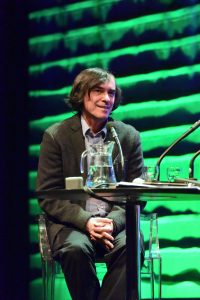
Is this the real life? Dat is het thema van het literaire festival Winternachten van dit jaar. Wat betekent fictie in een wereld waarin fake de boventoon lijkt te voeren? En over fake gesproken – gaat het populisme van Donald Trump ook hier zijn gevolgen krijgen?Serieuze onderwerpen, die – zoals het Winternachten betaamt – worden gebracht met een kwinkslag en omlijst door muziek, poëzie, voordrachten en animatie.
Maar of het nou door de inauguratie van Trump gisteren kwam of niet, de avond begon wat stroef. Na een prachtige lezing van de Australisch-Nederlandse schrijver Michel Faber volgden twee gesprekken. Eerst tussen Faber en Hanna Bervoets, die deze week twee prijzen won, daarna tussen de Roemeen Mircea Cartarescu en Tsjechische econoom Tomas Sedlacek, die bekend werd met zijn boek De economie van goed en kwaad (2009). Over het kapitalisme ging het, dat voor de mens zoveel geneugten, maar ook zoveel slechts heeft voorgebracht. Michel Faber zag het als een organisme dat zich zo heeft weten aan te passen dat het bijna onverwoestbaar is geworden. En over echt en fake ging het, waarover Mircea Cartarescu zei: ‘Alleen pijn is echt, dat wat je écht voelt.’ Volgens Faber is schrijven in de huidige tijd, waarin oppervlakkige entertainment, leugens en onwaarachtigheid te boventoon lijken te voeren, zelfs een daad van protest.
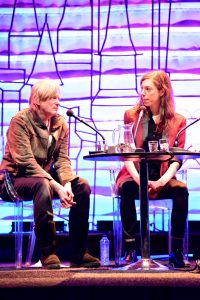
Vluchtelingen
Het belang van het vertellen van verhalen over wat er werkelijk gaande is in de wereld, om compassie en begrip voor elkaar te kunnen opbrengen, is daarom misschien nu wel groter dan ooit. In het programma-onderdeel ‘in the Mirror of Refugees’ spraken de schrijvers Tommy Wieringa, Olga Grjasnowa, Hassan Blasim, van wie net het indringende boek Lijkententoonstelling is verschenen, en de Rus Michaïl Sjisjkin. Blasim is afkomstig uit Bagdad, maar vluchtte van Irak naar Finland. ‘Het leven in Irak is een nachtmerrie,’ zei hij onomwonden. ‘Maar heel weinig mensen daar hebben een goed leven.’

Michaïl Sjisjkin kent de verhalen van vluchtelingen van een andere kant. Hij werkte enige tijd als tolk bij de immigratiedienst en hoorde zo talloze verschrikkelijke geschiedenissen van vluchtelingen. ‘Mensen die hun werk met hart probeerden uit te voeren, raakten binnen een mum van tijd opgebrand. Om het vol te kunnen houden moest je een soort robot worden. Mijn uitlaatklep was om erover te schrijven. Toen ik een boek had gepubliceerd, werd ik meteen ontslagen.’ Volgens Sjisjkin is fictie niet alleen een manier om een menselijk perspectief te behouden op de gruwelijkheden die vluchtelingen moeten doorstaan; ‘Het is een manier om de gruwelijkheden te boven te komen met liefde en menselijke warmte.’
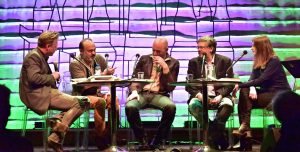
Digitale vriendinnetjes
In de zaal ernaast ging het er luchtiger aan toe. Het programmaonderdeel ‘De Verborgen Ruimte’ bracht voordrachten van een negental originele dichters, onder wie Hannah van Binsbergen, Marieke Rijneveld en Obe Alkema. Hierna sprak Simone van Saarloos in ‘Mirror Mirror on the Wall’ met Hanna Bervoets over onze neiging sprookjes te verkopen in de media en via de sociale media, en te geloven in het beeld dat we onszelf en elkaar voorspiegelen. Ook ging het over Bervoets aankomende roman Fuzzie, die in april verschijnt.
De roman gaat over de vormen die liefde kan aannemen en over de vraag of liefde niet voornamelijk een vorm van projectie is. Want als dat zo is, kunnen we dan niet van álles houden? Zoals van een pluizig, zacht bolletje – een fuzzie – dat praat en troost biedt? Het idee is een stuk minder abstract dan je misschien zou denken, liet de schrijfster zien. In Azië bestaat bijvoorbeeld Rinko, een vriendinnetje in de telefoon, dat aandacht voor je heeft, vraagt hoe het met je gaat, tegen je zegt dat je zo leuk bent. Niet alleen een middel tegen eenzaamheid, maar ook om te oefenen met relaties.
Bervoets onderzoekt in elke nieuwe roman bepaalde maatschappelijke conventies, normen en denkbeelden. ‘Ik wil laten zien waar normen en waarden vandaan komen en hoe die met de tijd veranderen.’ En dat zonder waardeoordeel: ‘Ik vind het onderscheid echt-nep bijvoorbeeld gevaarlijk. Omdat ‘nep’ minderwaardig wordt gevonden – “dat is zo nep.” Daarmee wordt het een gemakkelijke manier om dingen van tafel te vegen.’
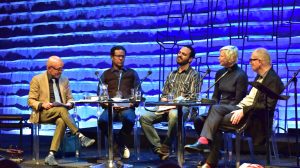
Het is hier geen Amerika – of toch wel?
Het debat in de grote zaal bestond uit het tweeluik ‘This is Not America’ en ‘Het is hier geen Amerika’. Het eerste deel bracht de schrijvers Ian Buruma, Colson Whitehead, Rodrigo Hasbún en Christine Otten samen in een pittig gesprek. Het ging over de verdeeldheid onder de bevolking in Amerika en de diepe kloof die de verkiezing van Trump heeft blootgelegd. De reden van die verdeeldheid – het feit dat de twee kampen elkaar niet ontmoeten, niet spreken en daardoor ook niet begrijpen – werd tijdens het gesprek ook duidelijk.
Volgens Hasbún, van origine Boliviaan, maar sinds acht jaar woonachtig in Amerika, is er niet maar één Amerika, maar vele, afhankelijk van je achtergrond, woonplaats, huidskleur en de sociale klasse waartoe je behoort. ‘Er is een groot contrast tussen het Amerika dat ik ken en wat Trump representeert.’ Dat werd bevestigd door Colson Whitehead, die als zwarte Amerikaan gruwelt van alles waar Trump voor staat. ‘Als je op Trump stemt omdat je racistisch bent, ben je een asshole. Als je niet racistische bent maar toch op Trump stemt, ben je een asshole omdat je anderen met deze man opscheept,’ zei hij gevat. ‘Ik ken geen enkele Trump-stemmer en dat hou ik graag zo. Ik blijf liever in die bubbel, in een Trumpstemmersvrij leven.’
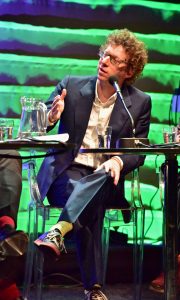
Populisme
Een begrijpelijke reactie, maar niet eentje die de kloof dicht, meenden Ian Buruma, Arnon Grunberg, Bas Heijne en Margriet Oostveen in de tweede sessie. Deze vier fileerden de oorzaken voor de ommezwaai in Amerika, en de kans dat zoiets hier gaat gebeuren in maart, bij de verkiezingen. Het populisme spreekt mensen zo sterk aan, aldus Heijne, omdat iemand als Trump of Wilders de dingen versimpelt. ‘Ze beloven een radicale versimpeling van een complexe samenleving waar de burger nog maar weinig van begrijpt. Ze beloven een radicaal herstel van autonomie. De retoriek van de populistische leiders is dat zij de stem van het volk vertegenwoordigen. Dat gaat in de richting van een dictatuur, want degene die een andere mening heeft, behoort dus niet tot het “echte volk”.
Grunberg ziet dat er een destructie gaande is van de naoorlogse orde, bijvoorbeeld van het taboe op het aanwijzen van zondebokken. De overeenkomst met wat er in de jaren dertig gebeurde is dat de status quo wordt kapotgemaakt door extreemrechts, en dat de groep in het midden niet genoeg van de status quo houdt om die te beschermen.’
Misschien is het hier dus toch ook al meer Amerika dan we denken, en dan veel mensen zouden willen. De vraag is hoe de kloof binnen onze samenleving niet tot net zo’n grote verscheurdheid gaat leiden als in de Verenigde Staten. In elk geval moeten de groepen met elkaar in gesprek gaan en blijven, meende Margriet Oostveen. ‘Je moet er alleen geen hoge verwachtingen van hebben.’
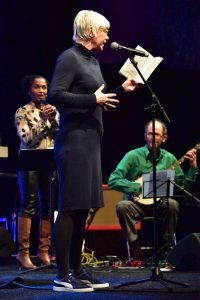
Het was geen vrolijk stemmend verhaal waarmee de mensen huiswaarts keerden, maar wél een belangrijk verhaal en veel stof tot nadenken. Gelukkig waren er nog de vrolijke beats van DJ Socrates om de nacht mee in te gaan…
